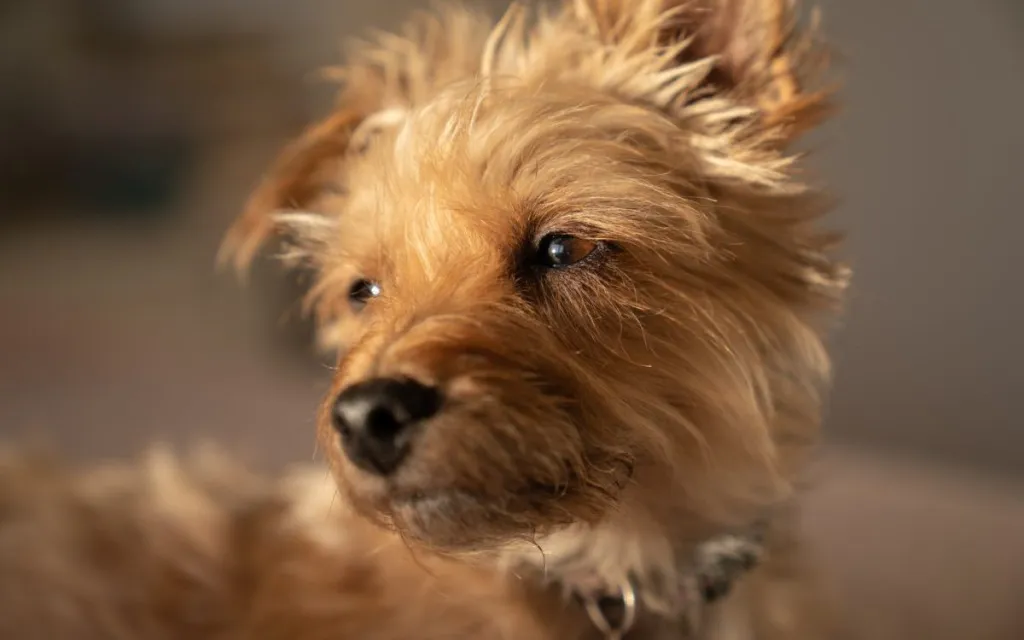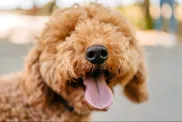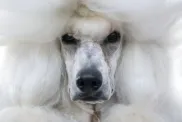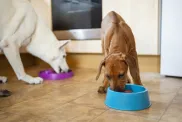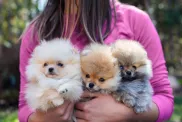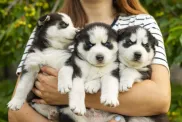The Yorkipoo is a small-sized hybrid breed created by crossing a Yorkshire Terrier with a Toy or Miniature Poodle. Often referred to as a Yorkie Poo, Yorkie-poo, or Yoodle, these small dogs typically weigh between 3 and 15 pounds, making them ideal for apartment living. Their soft, wavy coat can range from curly to straight and comes in various colors, including black, brown, cream, and white. Thanks to their Poodle lineage, many Yorkipoos have a hypoallergenic coat, which may shed less than other breeds, a bonus for allergy sufferers.
Regarding temperament, Yorkipoos are celebrated for their friendly, intelligent, and affectionate nature. They tend to form strong bonds with their families and are eager to please, which makes them relatively easy to train. Their playful energy suits them well for households with children and other pets, while their adaptable and low-maintenance care requirements make them a great choice for first-time dog owners. Additionally, Yorkipoos thrive as companion animals, service or therapy dogs, or emotional support animals.
Yorkipoo characteristics
- Height: 7 to 15 inches tall at the shoulder
- Weight: 3 to 15 pounds
- Lifespan: 10 to 15 years
Coat and color variation
Yorkipoos’ coats can range from soft and straight to wavy or curly, depending on the traits inherited from their Yorkshire Terrier and Poodle parents. They are typically fine-textured and may be low-shedding, often considered hypoallergenic, which is a bonus for individuals with allergies. Yorkipoos also exhibit a wide variety of colors, including solid shades like black, white, and brown, as well as mixed or patterned coats featuring combinations of cream, apricot, gray, and tan. Some may even have unique markings or a parti-color coat.
Physical traits and appearance
Size and build
- Small, weighing between 4 and 15 pounds.
- Compact and well-proportioned with a delicate yet sturdy build.
Coat type and texture
- Soft, can be straight, wavy, or curly.
- Low-shedding, often hypoallergenic.
- Colors include black, brown, cream, white, apricot, gray, tan, and parti-color combinations.
Facial features
- Head Shape: Small and slightly rounded.
- Eyes: Round, dark, and expressive, often with a bright and alert expression.
- Ears: Floppy and medium in length, sometimes feathered, adding to their soft appearance.
- Muzzle: Short to medium length, with a well-defined stop.
- Nose: Black or dark brown, depending on coat color, typically small and button-like.
- Mouth: Compact with a scissor bite; lips are usually dark-colored.
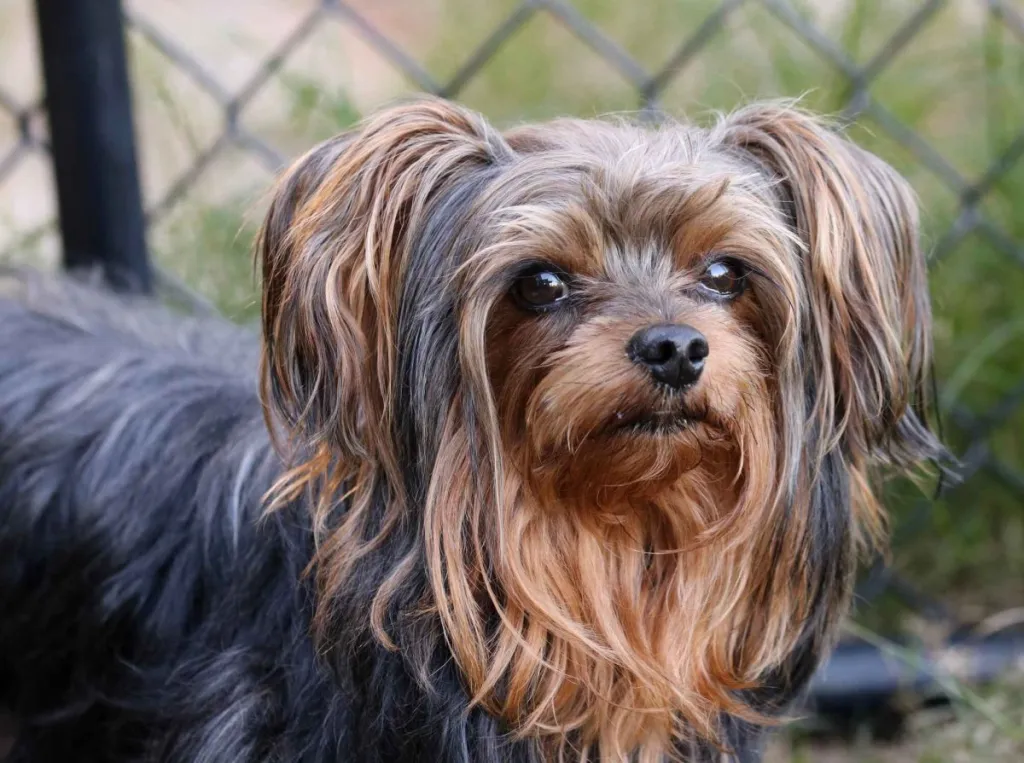
Do Yorkipoos shed?
Yorkipoos are considered low-shedding dogs, thanks to their Poodle ancestry, which often passes on a coat that sheds minimally. This trait makes them a popular choice for people with allergies, as their coat is frequently described as hypoallergenic. However, the level of shedding can vary depending on the individual dog and whether they inherit more coat traits from the Yorkshire Terrier or the Poodle. Regular grooming, including brushing, helps to manage any loose hair and keeps their coat healthy and tangle-free.
Yorkipoo personality
Yorkipoos are known for their lively, affectionate, and intelligent personalities. They are playful and energetic, and are often eager to join in family activities. They also have a cuddly and loving side, enjoying downtime with their owners. Thanks to their intelligence and eagerness to please, Yorkipoos are relatively easy to train and adapt well to different environments, whether it’s a bustling family home or a quiet apartment. They are sociable and typically get along well with children, other pets, and even strangers, though their loyalty often makes them attentive watchdogs.
Temperament and behavior traits
- Affectionate: Loves bonding with family and enjoys being close to their owners.
- Intelligent: Quick learners, making training relatively easy and enjoyable.
- Playful: Energetic and enjoys games and activities, great for families with kids.
- Sociable: Friendly with people, other pets, and strangers, making them great companions.
- Loyal: Forms strong attachments to their family, often displaying protective tendencies.
- Adaptable: Thrives in various living situations, from apartments to larger homes.
- Alert: Attentive and may bark to alert owners, functioning as a small watchdog.
- Gentle: Generally good-natured and well-suited for households with children or elderly family members.
Training and socialization
Early socialization and positive reinforcement training are crucial due to their intelligence and potential stubbornness. Of course, their intelligence allows them to pick up commands quickly, so early training is key to establishing good behavior from the start. Use praise, treats, and affection to reward desired behavior. Yorkipoos respond well to positive reinforcement, and this approach will keep them motivated and engaged.
Training tips:
- Be Consistent: Consistency is crucial in training. Use the same commands and routines to avoid confusion. This helps your Yorkipoo understand what is expected of them.
- Keep Training Sessions Short and Fun: Yorkshire Terrier Poodle mixes are intelligent but can lose interest if training sessions are too long or repetitive. Keep sessions short (10-15 minutes) and engage with varied activities.
- Mental Stimulation: Incorporate puzzle toys, obedience training, and interactive games into their routine to challenge their mind. A bored Yorkipoo can become restless or destructive. Once basic obedience is established, teach more advanced commands or tricks. Their intelligence makes them excellent candidates for agility training, fetch, or scent games.
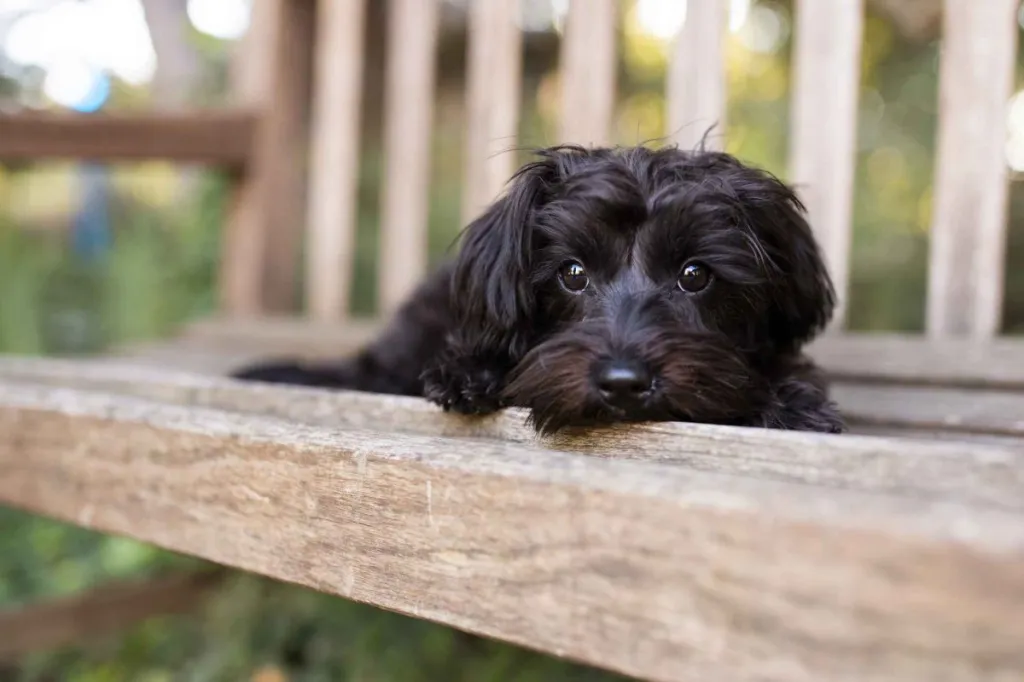
Yorkipoo care
As with all dogs, it’s important to keep up your Yorkipoo’s regular veterinary checkups to detect any health concerns early. Your vet can help you develop a care routine that will keep your dog healthy.
The Yorkshire Terrier Poodle mix’s coat comes in an array of colors, patterns, and textures depending on their genetic makeup. Like other Poodle mixes, they don’t typically shed much. Remember that this does not mean they do not cause allergies, only that they’re less likely to do so. Of course, breeds with Poodle-type coats sometimes need additional grooming to avoid matting.
How to groom a Yorkipoo
Grooming a Yorkipoo involves maintaining their coat, ears, nails, and teeth. Their grooming needs can vary depending on whether they inherit more of the Poodle’s curly coat or the Yorkie’s silky coat.
Coat care
Brushing:
- Frequency: Brush your Yorkipoo 2-3 times per week to prevent matting and tangles, especially if they have a curly or wavy coat. If their coat leans more toward the Poodle side, you may need to brush daily.
- Tools: Use a slicker brush or pin brush for their curly or wavy coat, and a comb to detangle any knots.
- Tip: Pay extra attention to areas that are prone to matting, like behind the ears, under the legs, and around the collar.
Bathing:
- Frequency: Bathe your Yorkipoo every 4-6 weeks or as needed. Frequent baths can dry out their skin, so stick to a gentle dog shampoo.
- Drying: After a bath, towel-dry and use a blow dryer on a low, cool setting if necessary. Make sure their coat is fully dry to prevent any moisture from causing irritation.
Trimming:
- Professional Grooming: If your Yorkipoo has a curly or thick coat like a Poodle, consider having them professionally groomed every 6-8 weeks. Groomers can shape the coat, keep it manageable, and trim around sensitive areas like the paws, face, and tail.
- Home Trimming: You can trim their coat at home using dog clippers or scissors for a tidy appearance, especially around the eyes and paws to avoid irritation.
Ear care
- Check for Dirt and Moisture: Yorkipoos may be prone to ear infections. Check their ears weekly for signs of dirt, wax buildup, or moisture, which can lead to infections.
- Cleaning: Clean their ears with a veterinary-approved ear cleaner and a cotton ball or pad. Avoid using cotton swabs, as they can push debris further into the ear.
Nail trimming
- Frequency: Trim your Yorkipoo nails every 4-6 weeks, depending on their activity level. Active dogs may naturally wear down their nails, but indoor or less active dogs will need more frequent trims.
- Tip: Use a dog nail clipper or a grinder. Be careful not to cut too far down, as hitting the quick (the blood vessel inside the nail) can be painful and cause bleeding.
Dental and eye care
- Brush Regularly: Brush your Shih-Poo’s teeth 2-3 times per week using a dog-specific toothbrush and toothpaste. Small breeds are more prone to dental problems. Frequent teeth brushing helps prevent plaque buildup.
- Dental Chews: Provide dental chews or toys to help reduce plaque and keep their teeth healthy.
- Clean Around the Eyes: If your Yorkipoo’s coat grows around their eyes, regularly trim the hair to prevent irritation. Use a clean, damp cloth to gently wipe away any eye discharge or tear stains.
Check for skin issues
- Inspect Regularly: As you groom, check their skin for any signs of irritation, redness, or bumps. If you notice anything unusual, consult a vet.
Flea, tick, and parasite control
Keep up with flea and tick prevention treatments, especially if your Yorkipoo spends much time outdoors. Regular grooming allows you to spot parasites early.
Early acclimation is key
Getting your Yorkipoo accustomed to grooming procedures from a young age makes the process easier and more enjoyable for both of you. Handle their paws frequently, examine their mouth and ears, and reward them for good behavior during grooming sessions. This positive foundation sets the stage for stress-free veterinary exams and handling throughout their lives.
Feeding and nutrition
Yorkipoos require a balanced diet that meets their size, age, activity level, and overall health. High-quality commercial dog food or a vet-approved home-prepared diet ensures they get essential nutrients, including protein, fats, carbohydrates, vitamins, and minerals. Given their small size, portion control is critical to avoid overeating, as Yorkipoos can be prone to obesity. Puppies, adults, and senior Yorkipoos have varying dietary needs, with puppies requiring more frequent meals and seniors benefiting from diets tailored for joint health and reduced activity. Treats should be given in moderation and factored into their daily caloric intake.
Puppies (2-12 months)
- Meals per Day: 4 meals until about 6 months, then reduce to 3.
- Portion Size: 1/4 to 3/4 cup of puppy food per day, divided into meals.
Adults (1-7 years)
- Meals per Day: 2 meals.
- Portion Size by Weight:
- 4-8 lbs: 1/4 to 1/2 cup of food daily.
- 9-15 lbs: 1/2 to 1 cup of food daily.
Seniors (7+ years)
- Meals per Day: 2 smaller meals.
- Portion Size: Similar to adults but adjusted for reduced activity levels. Senior-specific formulas are recommended for improved digestion and joint support.
Yorkipoo and family compatibility
Yorkipoos make excellent family pets, thanks to their affectionate, playful, and adaptable nature. They thrive in a variety of households, whether with singles, couples, or families with children. Their small size and gentle temperament make them especially well-suited for homes with young kids, though supervision is advised to ensure proper handling. Yorkipoos are social dogs who enjoy being part of family activities, bonding closely with their owners, and providing loyal companionship. They generally get along well with other pets, including cats or other small animals if properly socialized.. Their moderate energy level and easygoing demeanor make them a delightful addition to families of all sizes.
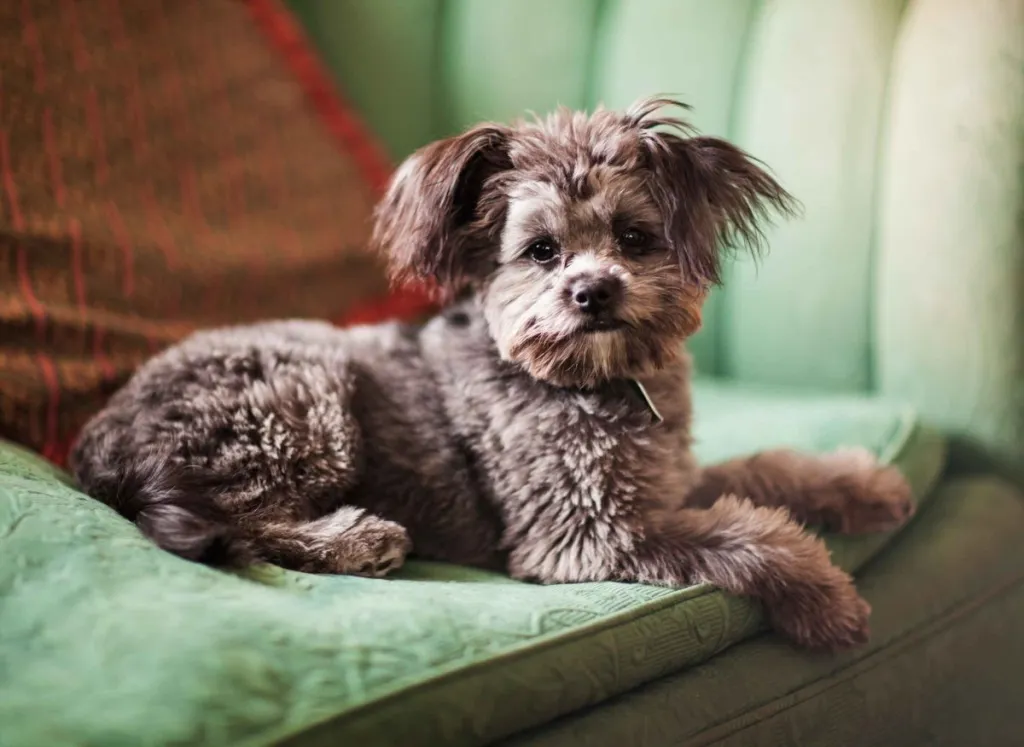
Health issues
Yorkipoos, like all breeds, can experience certain health conditions, and while not all individuals will be affected, it’s important to have awareness if considering this breed. When acquiring a puppy, it’s advisable to seek out a reputable breeder who can provide health clearances for both parents.
You can verify these clearances by checking the OFA website (offa.org). It’s important to consult a veterinarian for proper guidance on health management and prevention strategies to ensure a happy and healthy life for your beloved Yorkipoo.
- Portosystemic Shunt (PSS): This is an abnormal flow of blood between the liver and the body. That’s a problem, because the liver is responsible for detoxifying the body, metabolizing nutrients, and eliminating drugs. Signs usually appear before two years of age.
- Epilepsy: This neurological condition can cause mild to severe seizures, characterized by unusual behavior, staggering, or even falling down. While seizures can be distressing to witness, dogs with idiopathic epilepsy generally have a positive long-term outlook with proper diagnosis and treatment.
- Patellar Luxation: Common in small dogs, this involves the dislocation of the kneecap, causing discomfort. While it can be debilitating, many dogs lead normal lives with this condition.
- Legg-Calve-Perthes Disease: This hip joint condition is marked by decreased blood supply to the femur’s head, resulting in disintegration. Surgery can offer pain relief.
- Hypothyroidism: A disorder of the thyroid gland, it may manifest as epilepsy, hair loss, obesity, and skin issues. Treatment involves medication and dietary adjustments.
- Hyperadrenocorticism (Addison’s Disease): This serious condition arises from insufficient adrenal hormone production, leading to vomiting, poor appetite, and lethargy. Timely diagnosis through tests is crucial.
- Atopic Dermatitis: An inherited skin ailment causing allergic reactions to common substances, it results in itching, redness, and hair loss. Treatment includes allergen avoidance, antihistamines, and hypoallergenic shampoos.
Rescue groups
Yorkipoos are frequently acquired without a full grasp of the responsibilities that come with ownership. While they are less likely to show up in rescues than some other breeds, numerous Yorkipoos end up in shelters. Here are a few places to begin your search:
Finding a reputable dog breeder is one of the most important decisions you will make when bringing a new dog into your life. Reputable breeders are committed to breeding healthy, well-socialized puppies that will make great companions. On the other hand, backyard breeders are more interested in making a profit than in producing healthy, well-adjusted dogs. As a result, puppies from backyard breeders are more likely to have both health and behavioral issues.
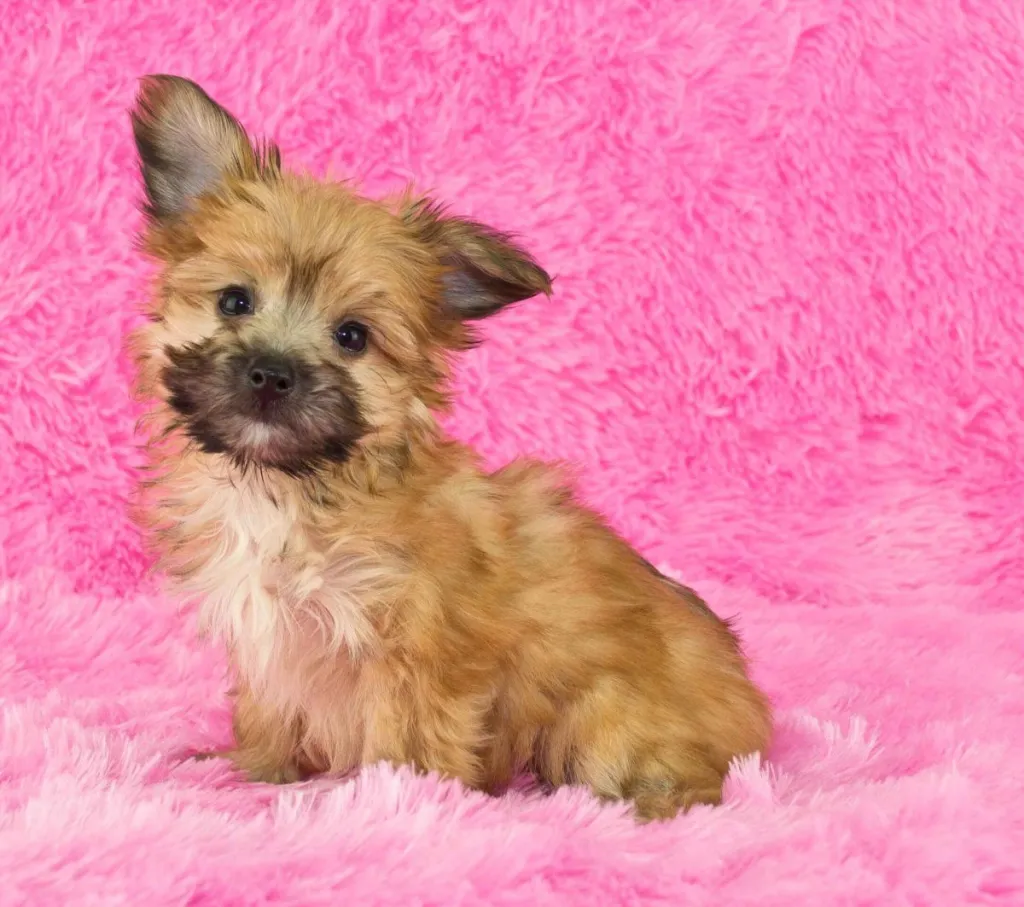
How much are Yorkipoo puppies?
The cost of a Yorkipoo puppy can vary widely based on factors such as the breeder’s reputation, the puppy’s lineage, coat color, size, and location. On average, Yorkipoo puppies are priced between $1,500 and $5,500. Puppies from reputable breeders or those with sought-after traits, like rare coat colors or breeding lines, may be on the higher end of the spectrum. Never purchase a Yorkipoo puppy just because they’re cheaper, as you may end up with a sick puppy or could be inadvertently contributing to inhumane breeding conditions.
